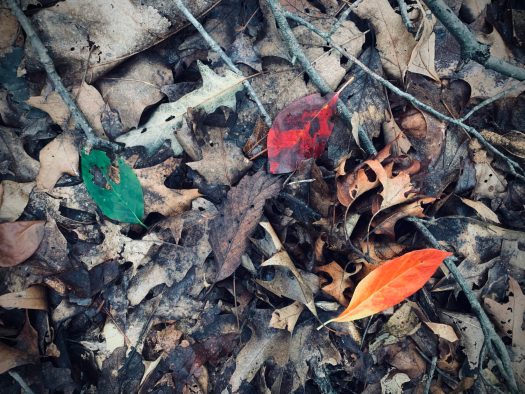
“Oh hey, buddy, how’s it going?”
“Oh, it’s GOING!”
Uproarious laughter. Two old friends at the small-town deli. I resist the temptation to turn around and look, but they seem genuinely surprised and impressed to find themselves still in the land of the living, still doing everyday things.
“I was just coming back from Surplus City, and I thought I’d STOP IN and PICK SOME THINGS UP!” Laughter.
“OH yeah! Good IDEA!” More laughter.
They’re probably no more than 15 years older than me, if that: a glimpse into my own future, perhaps. If I’m lucky. Artists and writers court amazement all day long with less evident success than these geezers at the store.

***

My favourite ridgetop tea-drinking spot is quieter each time I visit. Gone (or hiding while they molt) are the nesting tanagers and warblers. A wood pewee still calls, and a blue-headed vireo interjects at one point, but that’s about it. A nearby black gum has begun to color up, anticipating early migration and the need for signal flags saying FREE LUNCH.
fog walker
the millipede’s carpet
of legs
I take it back: both the black-throated green warbler and the robin who nested nearby are still around, just rarely singing. Sit here long enough and you’ll hear everything—or at least everything audible over the trains and traffic sounds from the valley. Now it’s an annual cicada calling just once and falling silent again. The sun comes half out. I see from my shadow it must be nearly eleven.
closed book
in my lap
a square of sunlight

***
The biggest change in literary blogging over the past 20 years has been the demographic shift from relatively younger to relatively older poets. In part of course that’s because some of the same contingent of people who were blogging in the aughts still dominate the literary blogging space. But there have been many more late adopters for whom blogging was a good fit, because as older writers, they’re not necessarily as ambitious. Meanwhile, today’s young poets are not blogging because that’s no longer seen as hip, and also because they are focusing all their efforts on writing for publication elsewhere. If they blog, it is purely to share writing or publishing news. I don’t write for a living and i’ve never been very ambitious, so blogging is an easy, nearly frictionless way to get my writing out there—especially these experiments in sorts of writing that very few publishers are interested in: absurdly long erasure poetry projects, weird tone-shifting hodgepodges masquerading as zuihitsu, that sort of thing.
The Xerox era was fun, and I’m glad I got to participate in the tail end of it, even publishing my first three chapbooks that way under the imprint Free Lunch Press (which I’m sure wasn’t original, but we didn’t have the web, much less Google yet, just small press directories that only included people organized enough to submit their info—not half-assed schmucks like us).
But this is better.
***

I found a black cherry tree dotted with congealed sap (above)—the original chewing gum. Though actually they dissolve fairly quickly. They’re rubbery and gelatinous and nearly tasteless. Which to me makes them highly attractive for extreme culinary purposes, should I ever be called upon to produce an Appalachian delicacy. Ya know, marinate in sassafras root bark infusion, drizzle with maple syrup and boom, you’ve got an appetiser to go with your mountain mint julep.
***
The biggest sign that Anglo-American civilization is doomed: the precipitous decline in shared mealtimes. If we can’t break bread together even as families, meaningful dialogue is clearly at an end. And what is culture about if not dialogue? Even the most solitary artist is still in dialogue with the greats.















 Picking red raspberries up on the Allegheny Front. Quite a switch from the more common black raspberries that Mom and I have been concentrating our berry-picking efforts on for the past week and a half, which signal ripeness by color change. With red raspberries, you have to kind of gently pinch them and see if they’re ready to let go. The dead ripe ones drop at the lightest touch. And they’re even sneakier than the black raspberries, bending canes down as they ripen so the best berries are often well hidden from above. They seem to be expressing an evolutionary preference for dispersal by small, ground-dwelling critters such as toads and turtles. Which makes sense, given their preference for wetter sites.
Picking red raspberries up on the Allegheny Front. Quite a switch from the more common black raspberries that Mom and I have been concentrating our berry-picking efforts on for the past week and a half, which signal ripeness by color change. With red raspberries, you have to kind of gently pinch them and see if they’re ready to let go. The dead ripe ones drop at the lightest touch. And they’re even sneakier than the black raspberries, bending canes down as they ripen so the best berries are often well hidden from above. They seem to be expressing an evolutionary preference for dispersal by small, ground-dwelling critters such as toads and turtles. Which makes sense, given their preference for wetter sites.









